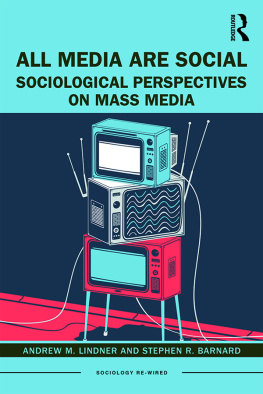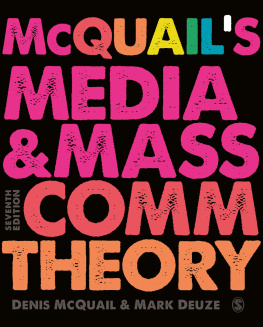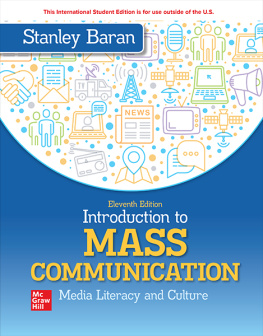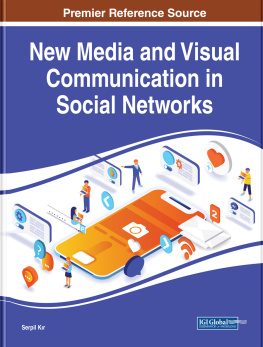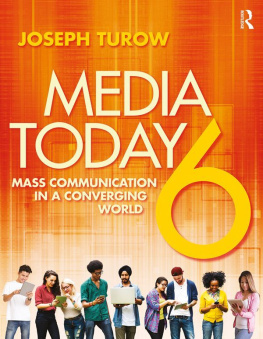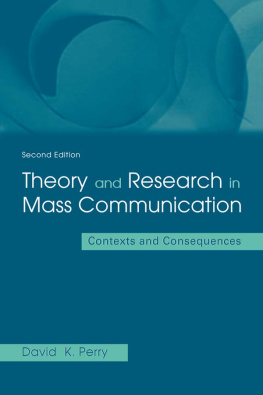The Media Syndrome
Over the past 40 years, award-winning sociologist David L. Altheide has illuminated how media formats and media logic affect our understanding of social issues, of how political decisions are made, and of how we relate to each other. In this masterful, summative work, Altheide describes the media syndrome: how these factors shape our expectations of, and reactions to, both public and personal events. Ideal for courses on mass media and political communication, this book
- provides a detailed description of the media syndrome and its impact on daily life;
- uses historical and contemporary examples from Watergate to Edward Snowden;
- includes the changes in the ecology of communication from mass media to social media and its social impact.
David L. Altheide is Regents Professor Emeritus in the School of Justice and Social Inquiry at Arizona State University, where he taught for 37 years. His work has focused on the role of mass media and information technology in social control. Author of fifteen books and over 150 professional papers, Altheide received the Society for the Study of Symbolic Interaction (SSSI) Cooley Award three times, given to the outstanding book in symbolic interaction, as well as the 2005 George Herbert Mead Award for lifetime contributions to SSSI, and the societys Mentor Achievement Award in 2007. His works include Terrorism and the Politics of Fear, Creating Fear: News and the Construction of Crisis, Media Edge, Media Power, and Media Logic.
First published 2016
by Routledge
711 Third Avenue, New York, NY 10017
and by Routledge
2 Park Square, Milton Park, Abingdon, Oxon, OX14 4RN
Routledge is an imprint of the Taylor & Francis Group, an informa business
2016 Taylor & Francis
The right of David Altheide to be identified as author of this work has been asserted by him in accordance with sections 77 and 78 of the Copyright, Designs and Patents Act 1988.
All rights reserved. No part of this book may be reprinted or reproduced or utilised in any form or by any electronic, mechanical, or other means, now known or hereafter invented, including photocopying and recording, or in any information storage or retrieval system, without permission in writing from the publishers.
Trademark notice: Product or corporate names may be trademarks or registered trademarks, and are used only for identification and explanation without intent to infringe.
Library of Congress Cataloging-in-Publication Data
A catalog record for this book has been requested
ISBN: 978-1-62958-146-0 (hbk)
ISBN: 978-1-62958-147-7 (pbk)
ISBN: 978-1-315-53297-4 (ebk)
Typeset in Minion
by Straight Creek Bookmakers
When the great writer Gunter Grass explained how he got sucked into being a Nazi in WWII, he said, It was the newsreels. I was a pushover for the prettified black-and-white truth they served up. This book examines how media logic has influenced significant events and issues over a forty-five-year period. The media syndrome refers to the prevalence, impact, and significance of media logic, communication formats, and media content in social life. The media syndrome might include individual personas and identities, social issues, and political actions that are modeled on media personalities and characters situated in entertainment-oriented public and popular culture scenarios that are depicted and constituted through media logic, including information technology and communication formats. I selected events and issues that I studied throughout my academic career, although other examples could have illustrated how our expanding ecology of communication, built on new information technologies and communication formats, has affected how we do things and how we interact with each other, as well as the contours of the social and public orders. The aim is to demonstrate through specific events and issues how information technology and media logic not only shaped the events, but also influenced the social meanings for audiences, in addition to molding future events. Moreover, in several instances, I suggest that some of the events (e.g., Watergate) would have been fundamentally different in another media era.
We are beyond the time when it was mainly politicians who took into account the media; now, much of what political leaders and their minionsus!do reflect the logic, perspectives, rules, and frameworks of not only the mass media, but social media as well. Our lives have fundamentally changed as media have become instantaneous, personal, and visual (Altheide, 2014). I refer to not just individual habits and routines, but social institutions as well.
One of the events examined in some detail in the pages to follow is the Iranian Hostage Crisis in 1979-1980, when fifty-two Americans were held hostage for 444 days (of 66 initial hostages, 14 were released). Daily news coverage of their plight often included well-orchestrated edicts from the Ayatollah Khomeini, the Supreme religious leader of Iran. How differentyet similarwere the instantaneous tweets sent by Ayatollah Ali Khamenei in April 2015 commenting on the murder of yet another black man (Freddie Gray) by police and subsequent rioting in Baltimore. He tweeted, Power and tyranny are different. In some countries like US, police are seemingly powerful but they kill innocents. Even the Ayatollah communicates electronically! Just like the rest of us, he, too, joins nearly 1.5 billion users of Facebook worldwide. The events that follow into the twenty-first century will continue to reflect the media syndrome. For example, the 2016 U. S. presidential primary campaigns exemplify entertaining conflict, with faux debates cast as fight night. I invite readers to continue the research process and track how personal, social, and political life are reflexively linked to the communication and mediated order. It should be exciting.
In many ways, this book builds on four decades of work and is the culmination of the approach and perspective that helps clarify the nature and impact of the media in our lives. One of the major works that has endured and continues to inspire and shape a large body of research on the mediated order is Media Logic (1979), co-authored with my brilliant colleague and dear friend, Robert P. Snow. In that work, we set forth what some colleagues claimed was a paradigm shift in approaching the impact of media on personal lives, social activities, and institutional patterns. Some of the early work reported in the present volume contributed to understanding and identifying the foundations of media logic, and subsequent works refined this perspective, particularly the overwhelming impact of the entertainment format and the discourse of fear, which in turn was cultivated by the worldwide use of the politics of fear.
Numerous friends, students, and researchers have helped nurture the perspective and work that has gone into this project, a capstone of a lifetime of work. I have acknowledged many of these exceptional individuals in many previous books about the nature and impact of the media on social life. In order to not risk omitting anyone who has helped so much, I will not repeat the names of dozens of friends and colleagues, but I must mention a few cornerstones of my education and sensitivity to the media world. My mentors at the University of California, San Diego, include Jack Douglas, Stanford Lyman, and Joseph Gusfield. My dear friends and colleagues John Johnson and Robert P. Snow encouraged and worked with me in developing an approach to understanding the media order that would be consistent with a sociological imagination. Other colleagues, like Gray Cavender, at the School of Justice and Social Inquiry at Arizona State University, contributed in enduring ways, as did a number of prominent symbolic interactionists throughout the world, particularly Norman K. Denzin and Carl J. Couch, as well as insightful sociologists like Richard V. Ericson, Aaron Doyle, and Marion Adolf. I have learned much from Lance Bennett, Frank Furedi, and Ray Surette. My amazing students know who they are, including Joe Kotarba, Michael Coyle, Jennifer Grimes, Chris Schneider, and Ray Maratea.



